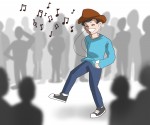Trace Jansen feels alone in his love for country music at UCLA.
For Jansen and other fans, the country music scene at UCLA is characterized more by hostility from other students rather than the welcoming culture he experienced back home in Oregon. The first-year economics student has met few other fans thus far at UCLA, and from his experience, the genre lacks strong support on campus from fellow students and organizations like Campus Events Commission.
Jansen said country music popularity is strongly determined by the culture of a particular region. Because UCLA is located in Southern California, an urbanized place, the rural inspired lyrics of the genre are not relatable enough to garner a fan base, unlike in his hometown of Albany, Oregon, he said.
“There are two types of music that you could listen to in Albany,” Jansen said. “There is … the rap type stuff, and then there is country, and I guess I chose that.”
Sarah Crowley, a first-year business economics student and Jansen’s friend, also listens to country music. She said she believes her hometown of Sacramento was an important influence on her music taste because she grew up next to the Sleep Train Amphitheatre, a popular venue for big-name country artists like Luke Bryan.
The urban environment of Sacramento initially proved to be a challenge in connecting with the words of the songs because they spoke of a different lifestyle.
“It’s pretty difficult to relate to because that’s not at all what my life is like,” Crowley said.
She said people who dislike country tend to focus on stereotypical country themes, like farming and drinking, when in reality, a number of songs deal with the universal theme of love.
Alex Ferrer, a first-year geography and international development studies student, dislikes contemporary country music. He prefers to listen to rock and experimental pop and was influenced to do so by growing up in northern New Jersey. He said country has an intellectual stigma because it is neither challenging in vocabulary nor deep in theme.
“It has the perception of being about as intellectually stimulating as a 2×4,” Ferrer said.
Jansen and Crowley said they are criticized by their peers when they share their music taste. While Crowley often keeps her appreciation for country music to herself, Jansen is more willing to openly express his country side.
Jansen said phrases like “You’re probably really stupid” or “You have a low I.Q.” are common insults he receives.
Christina Amini, a third-year psychobiology student and a Campus Events Commission concert staff member, said country music does not have a large following at UCLA as opposed to hip-hop or electronic music. When curating concerts, Amini said she must take into account the music taste of the student body population.
Due to CEC’s limited funding, Amini said CEC refrains from spending money on an event that will not draw a large crowd.
“We haven’t had a push to get country artists from a lot of people,” Amini said. “I feel like if we did have a ton of people coming up to us and saying ‘Hey, why don’t you do this?’ we would definitely take it into consideration.”
Amini said the CEC concert staff is not very knowledgeable about up-and-coming country artists. The staff’s focus this year has been on electronic music, and in order to host a country event, they would need to do more research.
Scott Linford, an ethnomusicology graduate student, has studied both the musicality and history of country music. He leads UCLA’s Bluegrass and Old Time Ensemble, which to his knowledge is the only country group on campus.
He said he remembers his peers in high school inquiring about each other’s music taste, where the typical response was listing every genre but country.
Linford said the country music played on the radio encourages a certain stereotype, where the artists sing with an identifiable accent that associates them with working-class America and a specific region of the country like the Southeast.
He said he has received overwhelmingly positive feedback from his students when teaching the history of country music. Because he approaches the genre from an academic context, with special focus on racial, economic and gender politics, his students are more receptive to and interested in the genre.
“To me, I always think of it as the history of country music is basically the history of America,” Linford said.
Jansen, however, has not been met with the same reactions as Linford. When criticized for his music, he defends himself not with academia, but with humor and a hint of sarcasm.
“I tell everybody, ‘I’m more American than you,’” Jansen said.
